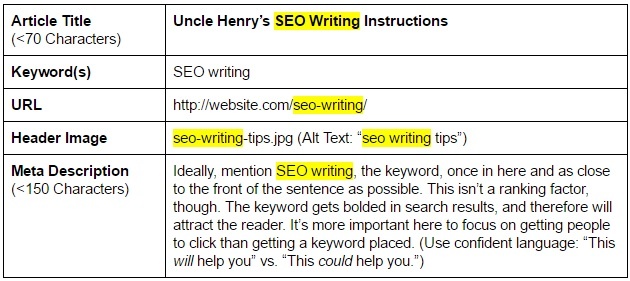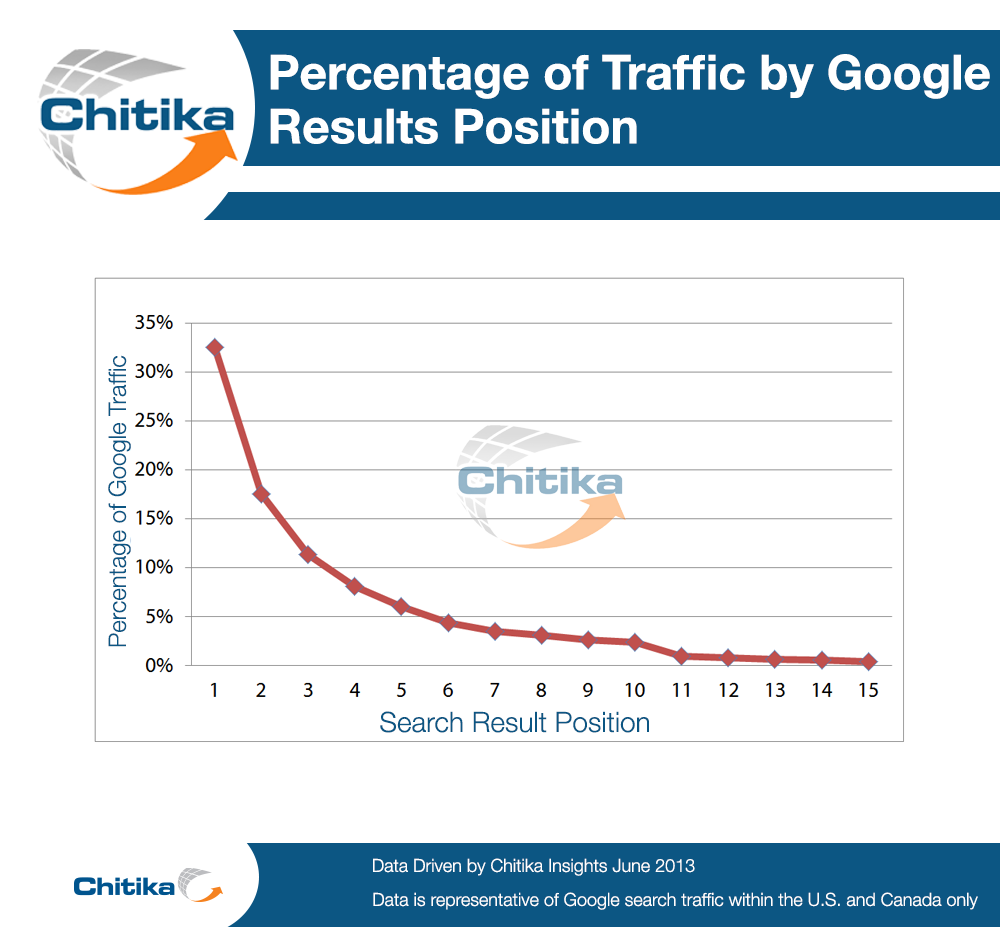The Only (Only!) 2 Reasons Your Blog SEO Doesn’t Work

I’m a big fan of ambition, so don’t take this the wrong way... but you have no shot at ranking for the blog keywords you’re targeting.
You could parallel this to the talk from your parents, “Do your homework, ‘cause you’re not going to play in the NFL.” Or when your buddies say, “You have no chance with that girl.”
It’s great to be ambitious, but you need your family and friends to keep it real. So consider me your “blogging family” (that was painful to write) for the next few minutes. I’m here to help you keep it real with your blog’s SEO strategy.
Hear me out.
Reason #1: You just don’t have the website authority.
What is website authority? Put simply, it is a measure of how much Google trusts your site as a place for searchers to find valuable information. And if you don’t have it, you won’t have a chance of ranking on the first page (or anywhere close).
Everyone says they do content or inbound marketing—it’s easy to say. But one thing I’ve learned about how to distinguish between “those who can” and “those who can’t” is how they target keywords based on their website’s authority.
Example: If you have a brand new website and you’re trying to target “mobile app development”—a super competitive term—you don’t have a chance.

With this hypothetical new site of yours (or an old site that doesn’t have any authority), I’d highly recommend targeting keywords with low competition rather than ones with high search volume. In this scenario, you have a few options:
- Target “mobile app development” as a keyword for your blog, and you’ll receive exactly zero out of a potential 100K visitors per month.
- Target “how to choose a mobile app development company” and you’ll have a shot at a share of 100 visitors per month.
If both of those terms would bring the right visitors to your site, wouldn’t you much rather have a shot at 100 visitors than zero?
How do you know if your website is authoritative?
There are a few different metrics out there that can help you determine the authority of a website, and all of the ones I trust have been developed by Moz:
- Domain Authority: A 100-point scale that determines how well an entire site might rank in search engines.
- Page Authority: A 100-point scale that determines how well a specific page on a site might rank in search engines.
- MozRank: A 10-point scale that determines the number and quality of backlinks pointing to a web page. (Now that I think of it, I wonder why Moz didn’t just put MozRank on a 100-point scale to be consistent with the others. Maybe @randfish can help answer that?)
These three metrics will give you an estimate of your site’s authority, but I don’t want to get too scientific here, since there are so many other factors beyond authority that will determine whether or not you rank for a keyword. Instead, let’s take a look at an example.
Example: Nectafy Vs. HubSpot’s Authority
Nectafy is an inbound marketing agency, whereas HubSpot offers inbound marketing software. We’re a partner agency to HubSpot, so we’re not competitors in business terms, but we do compete in Google’s search results on various topics from time to time.
But as I mentioned earlier, I’m a realist. Take a look at the difference in our website authority:
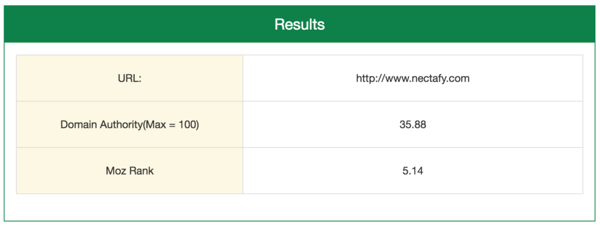
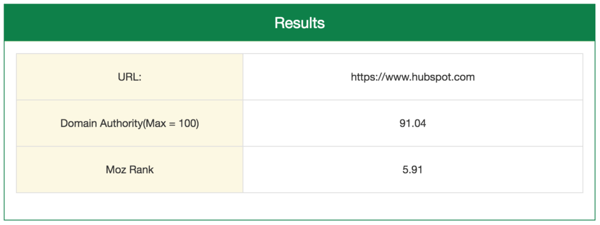
(I got these tables from Small SEO Tools because I like the layout, but you can also go straight to Moz’s Open Site Explorer to find these results.)
Our MozRanks are shockingly not much different (5.14 out of 10 for Nectafy and 5.91 for HubSpot), but you can see the difference in Domain Authority (35.88 out of 100 for Nectafy and 91.04 for HubSpot). HubSpot has a much more authoritative site than Nectafy, so hubspot.com can rank for much more competitive keywords.
- For the keyword “inbound marketing”: HubSpot ranks #2 on Google, whereas Nectafy ranks #61. It’s a competitive term with a lot of search traffic.
- For the keyword “inbound marketing plan”: HubSpot ranks #1 and #2, and Nectafy ranks #3. It’s a less competitive term with fewer searches.
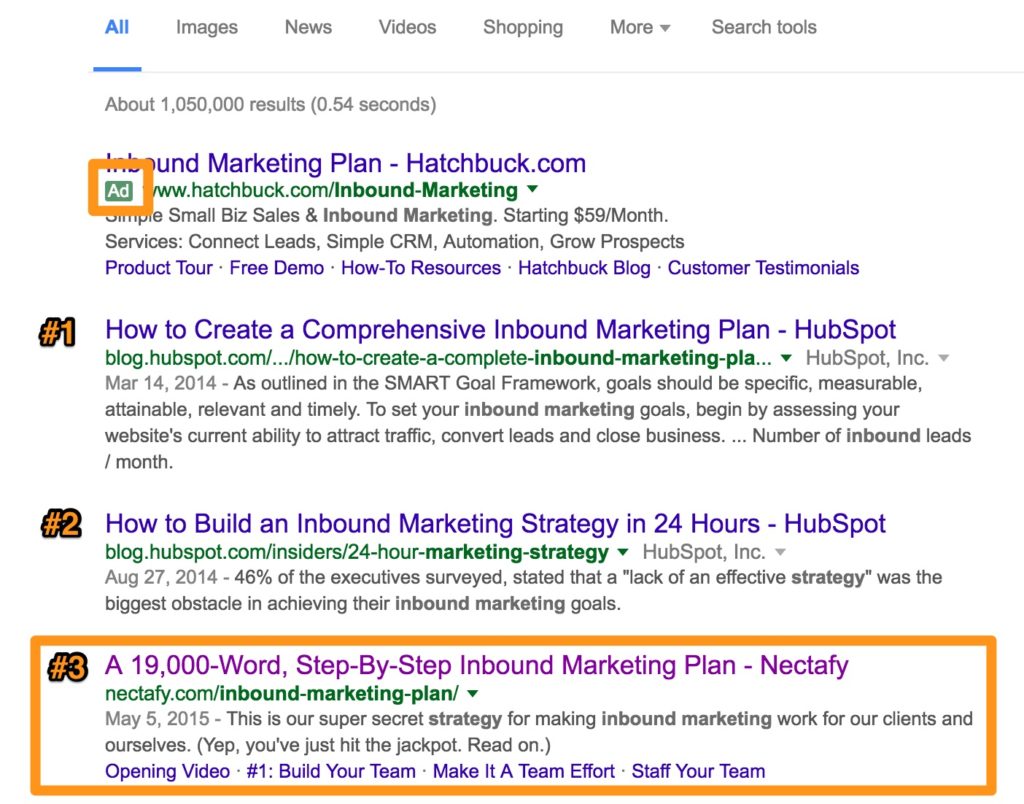
Our site authority holds us back for competing on “inbound marketing” as a keyword, but we’re able to play with the big boys for less competitive terms like “inbound marketing plan.” And you know what? I’d rather rank for that term since it brings more targeted people to our site, as we build and administer inbound marketing plans for companies.
Reason #2: Your blog SEO plan completely ignores resource-based keywords.
If you really need to target competitive keywords right away, you’ll need to do a lot of work, alongside blogging, to increase your site’s authority. (Something like Brian Dean’s Skyscraper Technique is a good start, but it takes a lot of work to get high quality backlinks, and it will require work and skill beyond your blogging efforts, which your team may not have the time or ability to execute.)
If your company is more flexible and willing to consider other types of keywords, you should start looking for resource-based keywords.
Resource-based keywords are phrased in a way that indicates that the searcher is looking to solve a problem. These keyword phrases will include terms like “how to,” “tips,” “plan,” “example,” “template,” etc.
Sales-based keywords tend to be those really competitive bottom-of-funnel (BOF) or sales-based phrases—the ones you may be struggling with. Sales-based keyword phrases include terms like “software,” “service,” “tool,” “company,” “platform,” etc.
Take a look at your current list. If it includes a bunch of competitive terms that end in something like “software” you are probably missing out on some other good options. Figure out which questions your buyer personas are asking, and answer those with search phrases. That’ll get you started with resource-based keywords.
See Also: A Non-Competitive SEO Strategy: Comparison Keywords
A Final Reality Check
Here are a couple key takeaways that will help you make sure your blog SEO actually works in the future.
- While I’d love to give some scientific advice about your site’s authority and the range of competition you can target (like, “If your site is a 15 out of 100, make sure to target keywords with a competition index of under 15%”), it doesn’t work out linearly like that, since other factors beyond authority play a role.
So I’d advise you to check the specific rankings for all of your current blog posts, then ask yourself:
- Which articles actually have keyword rankings and are bringing in traffic?
- Of all those keywords we rank for, is there a theme in the competition level?
Then, plan more content that targets the phrases with a competition level that your site can handle.
- Before you plan your next round of blog content, think about your personas. What challenges can your company help them solve? This topic list will turn into a great list of resource-based blog articles that you may actually have a shot at ranking for.
If you feel like you could be getting more out of your blog, I hope you’re able to have an honest dialogue about your approach to SEO. You may be asking too much from your site considering its current authority level.


